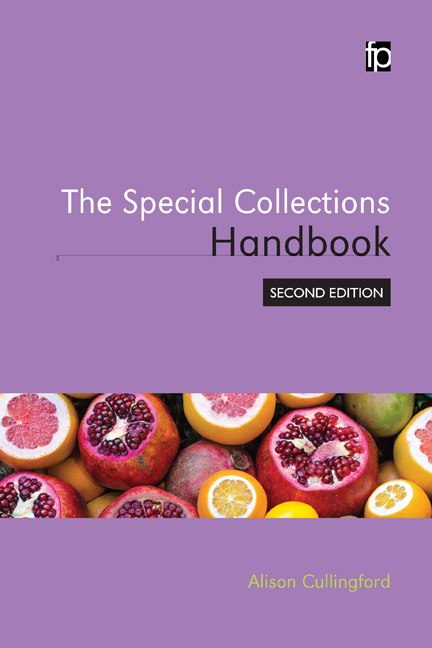Book contents
- Frontmatter
- Contents
- Preface and acknowledgements
- Introduction
- 1 The care of Special Collections
- 2 Emergency planning for Special Collections
- 3 Understanding objects in Special Collections
- 4 Acquiring and developing Special Collections
- 5 Cataloguing, description and metadata in Special Collections
- 6 Digitization and digital libraries in Special Collections
- 7 Legal and ethical issues in Special Collections
- 8 User services in Special Collections
- 9 Marketing and communications in Special Collections
- 10 Widening access to Special Collections
- 11 Organizational resources for Special Collections: space and people
- 12 Influencing and fund-raising for Special Collections
- Afterword: Special Collections futures
- Appendix A The Special Collections reference shelf
- Appendix B Skills for your Special Collections career
- Bibliography
- Index
Appendix B - Skills for your Special Collections career
- Frontmatter
- Contents
- Preface and acknowledgements
- Introduction
- 1 The care of Special Collections
- 2 Emergency planning for Special Collections
- 3 Understanding objects in Special Collections
- 4 Acquiring and developing Special Collections
- 5 Cataloguing, description and metadata in Special Collections
- 6 Digitization and digital libraries in Special Collections
- 7 Legal and ethical issues in Special Collections
- 8 User services in Special Collections
- 9 Marketing and communications in Special Collections
- 10 Widening access to Special Collections
- 11 Organizational resources for Special Collections: space and people
- 12 Influencing and fund-raising for Special Collections
- Afterword: Special Collections futures
- Appendix A The Special Collections reference shelf
- Appendix B Skills for your Special Collections career
- Bibliography
- Index
Summary
Getting into Special Collections work
Special Collections work remains a popular career choice; new entrants are drawn to the mixture of fascinating material and varied opportunities. It is therefore a competitive sector, a problem compounded by low turnover (staff tend to stay in jobs they enjoy for many years) and lack of opportunities at senior level. As in all job sectors, prospective Special Collections librarians are advised to monitor the market, see and try to fill their skills gaps, reflect on their own practice and strengths, and produce high-quality applications. Engaging with the profession at events and via the listservs and social media will help. Many of the skills required can be developed in other aspects of library or other work, for example customer care and project management.
This book gives a flavour of the core skills for Special Collections work. Of course many Special Collections librarians have specialist roles, but this work needs to be informed by understanding of the basics, for example collections care.
The Special Collections sector is notable within the library profession as an area in which rapid technological change has not made traditional skills irrelevant. This means that new entrants need both the older skills from established areas of professional practice (cataloguing, collections care, historical bibliography) and newer ones for emerging areas of work (digitization, social media, outreach, augmented reality). This mixture of ancient and new endeavours is one of the elements that makes this work so rewarding.
Skills frameworks
The professional associations for librarians have produced skills frameworks to help Special Collections librarians and employers assess training needs.
CILIP PKSB. In 2012, CILIP launched the Professional Knowledge and Skills Base (PKSB), a structure listing areas of knowledge and skills. Ethics and values are core, along with generic skills and professional expertise, and the wider context. The PKSB is designed for librarians to rate their own skills and knowledge and decide in which areas they need to improve: it is highly unlikely that anyone will need to be expert in every single area! To help members analyse their skill sets, CILIP have produced sector templates for Rare Books and Special Collections (newly qualified and experienced staff), available via the CILIP VLE.
- Type
- Chapter
- Information
- The Special Collections Handbook , pp. 275 - 278Publisher: FacetPrint publication year: 2016



